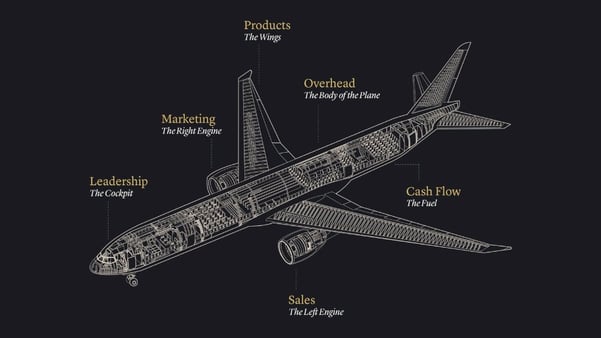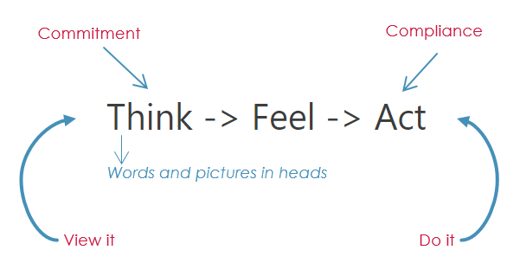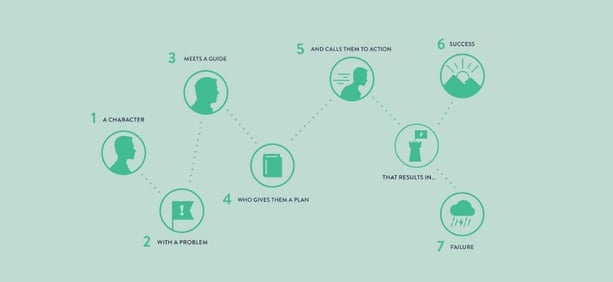It's been over two weeks since we attended BizX, and we've spent this time digesting everything we have learned. The event was packed with great insights and expert knowledge, so we’ve just picked out a few highlights that stood out to us.
Transforming Business Strategy with Storytelling: Key Insights from Donald Miller
Donald Miller, the renowned author of "Building a StoryBrand," captivated us with his innovative approach to business communication and strategy.
Miller uses a compelling aeroplane analogy to illustrate the essential components of a successful business.
- Leadership is the cockpit, providing direction and oversight.
- Marketing powers the right engine, propelling the business forward through visibility and engagement.
- Sales, the left engine, works synergistically with marketing to drive business performance.
- Products, symbolised by the wings, lift the entire operation by delivering value.
- Overhead forms the body of the plane, supporting the structure and functionality.
- Cash flow, much like fuel, is critical to keep everything running smoothly.

The Human Brain and Marketing Efficiency
Miller explains the objectives of the human brain:- Survive and thrive
- Conserve calories
- Ignores unnecessary information - Only provide information that hits the survive and thrive aspect if the brain
In marketing, clarifying your message is key. Miller's mantra, "If you confuse, you'll lose," underscores the necessity of delivering a clear, concise message.
He emphasises using brief sound bites and positioning your product as an essential solution to a relevant problem.
The StoryBrand Framework
Donald Miller's StoryBrand Framework provides a strategic blueprint for crafting compelling narratives through marketing efforts:
- A Character: The customer must want something defined clearly within the first three minutes.
- With a Problem: Highlight a relatable problem—this becomes the hook of your story, with a focus on a 75% problem, 25% solution ratio.
- Meets a Guide: Position your brand as a guide with wisdom. Show empathy, articulate frustrations, and back your guidance with statistics and facts.
- Give a Plan: Outline easy steps for the customer to follow, which helps reduce perceived risk and encourages progress. This plan should include specific actions like reporting and implementation.
- Call to Action: You can only effectively ask for the sale after establishing the context. Reassure the customer that choosing your product is right, emphasising survival benefits such as cost savings or enhanced status.
- Success: Clearly define what success looks like with your product.
- Failure: Outline the stakes if the customer decides against the purchase, emphasising what's at risk.
Crafting Your Message
To effectively apply Miller's principles, start with a one-liner that encompasses:
- The Problem your customer faces.
- The Solution your product or service offers.
- The Positive Result of choosing your solution.
This structured approach not only enhances customer engagement but also ensures your message is as impactful as possible, driving both understanding and action.
Insights on AI and Business Success from Piers Linney
Piers Linney, renowned for his role on "Dragons' Den" and his investment expertise, delivered a session at BizX, exploring the potential of AI and outlining five key factors for business success.
Embracing AI in Business
Linney emphasised the transformative impact of Artificial Intelligence on businesses. Here are the essential points he highlighted:
- Record Everything: Capture as much data as possible—it’s a treasure trove that can be analysed later to uncover valuable insights.
- Augment Your Team: Integrate AI tools to enhance team capabilities and efficiency.
- AI-Enhanced Customer Service: Implement AI to deliver superior customer service, ensuring faster, more accurate responses.
- X-Ray Vision: Utilise AI to analyse data, such as during customer interactions, to identify and seize missed opportunities.
Five Factors for Sustaining Business Success
Linney also detailed five critical factors that contribute to the longevity and success of a business:
Planning:
- Develop clear, communicable plans that include all stakeholders, ensuring everyone is aligned and invested in the business objectives.
- Focus decisions on moving closer to your strategic goals.
Operations:
- Where possible, automate processes to enhance efficiency and excellence while managing risks effectively.
People:
- Growth demands the hiring of specialists who bring in-depth knowledge and skills.
- Embrace diversity to enrich perspectives and ideas.
- Clearly plan for team development and provide the necessary tools to achieve these goals.
Finance:
- Financial strategies require careful planning and time—typically six to nine months.
- Consider the implications of external investments, including issues related to ownership and governance.
Technology:
- Ensure technology systems are accessible and interconnected, allowing you to concentrate on core business areas.
- Implement robust cybersecurity measures to protect your data and operations.
Key Takeaways on Customer Service from Michael Heppell
In his BizX presentation, Michael Heppell shared some valuable insights on how to enhance customer service. He stressed the importance of personal development as the foundation for providing excellent service.
According to him, it is essential to improve oneself before aiming to improve service for others. He summed up this idea by saying, "You can’t be better for your customer unless you are better for yourself first."
The Importance of Words and Confidence
Heppell highlighted the significant impact of language in service interactions. For example, transforming phrases like "X is a nightmare" into "X could be a dream" can shift perceptions and foster a more positive dialogue.
He also pointed out that a lack of confidence is often the biggest hurdle to providing brilliant service, suggesting a mindset shift by viewing fears as False Evidence Appearing Real (F.E.A.R.).
Practical Advice for Brilliant Service
To overcome these challenges, Heppell recommends:
- Increasing the pace of actions to inject energy into service delivery.
- Focusing on team dynamics and fun to build confidence and improve service quality.
- Proactively engaging customers with a smile and greeting before they do, which sets a positive tone.
These insights from Heppell not only enhance customer interactions but also contribute to a more dynamic and confident service team.
Insights from Jamil Qureshi
Jamil Qureshi's session at BizX provided a plethora of insights on optimising team performance and enhancing organisational dynamics. Known for his expertise in performance psychology, Qureshi laid out principles that can revolutionise how we think about work, innovation, and leadership.
Leveraging Strengths and Creating Connections
Qureshi emphasised the importance of consistency in leveraging individual and team strengths. He defined success as "making a connection between two things previously unconnected," encouraging a mindset that seeks innovative links and solutions. This approach not only fosters creativity but also drives meaningful advancements.
Building Effective Teams
Key to Qureshi’s philosophy is the idea that high-performing teams thrive in environments of high diversity and psychological safety, where team members can express ideas and take risks without fear.
He advocated for giving teams problems to solve rather than tasks to complete, which engages their creativity and problem-solving skills more deeply.
Mindset, Motivation, and Action

The cycle of Think, Feel, Act (T.F.A) was highlighted as a critical driver of success. How teams think about challenges, feel about their work, and then act can significantly impact their outcomes.
Qureshi also noted the power of passion as a "significant multiplier," urging leaders to increase purpose to maximise profit and keep constantly focused on their goals.
The Value of Attitude and Continuous Learning
"Attitude is more important than intelligence and facts," Qureshi remarked, stressing that how we think about what we know can be more crucial than the knowledge itself. He also pointed out that successful teams are often stewards of their own success, wary of losing rather than eager to win, which can paradoxically make losing more likely.
Key Principles for Organisational Excellence
Qureshi shared several principles for cultivating a forward-thinking, innovative environment:
- Encourage experimentation (as those who experiment most are likely to win.)
- Ensure the pace of internal change matches the external pace of change.
- Foster a human-led, tech-enabled approach to leverage technology while prioritising human interaction and creativity.
"Define yourself by the value you create for others,"
Insights from Deborah Meaden
Deborah Meaden, known for her astute business insights on "Dragons' Den," shared her philosophy on achieving sustained business success. Her talk focused on foundational attitudes and strategic thinking necessary for growth and innovation.
Core Principles for Business Growth
Meaden stressed that your background doesn’t determine your future; rather, it's your vision and where you're heading that truly matter. She emphasised the importance of:
- Using Effective Tools: Adopt useful strategies and tools while discarding what doesn’t serve your business goals.
- Commitment: Likening it to raising a child, commitment requires nurturing and long-term dedication.
- Creativity and Drive: Essential for solving challenges and pushing forward.
The Triad of Success
Her framework for business achievement revolves around three interacting components:
- Passion: Fuels your motivation and dedication to your business.
- Focus: Needs to be both immediate to manage the present and forward-looking to envision the future.
- Insatiable Desire to Achieve: Keeps you striving for more, never settling.
Time Management and Decision Making
Meaden provided a unique perspective on managing time:
Wasted: Time not contributing to your goals.
Spent: Necessary expenditures of time that maintain the status quo.
Invested: Time used in a way that returns value, including joy.
She advised to not dwell on the opinions of those who do not know you personally or professionally, emphasising that confidence is key to attraction in business.
Building a Strong Business Culture
Culture and Proposition: Understand how your business operations and goals are beneficial not only to the market but also to your team.
Personas: Regularly assess and understand your customer personas, adapting as their needs evolve.
Trust and Respect: Be quick to apologise and transparent in your solutions, fostering a culture of honesty and accountability.
Meaden advised getting to the facts quickly and maintaining a high pace in business operations to keep up with market demands. Remembering and focusing on what the customer truly wants is paramount.
Mastering Sales: Key Strategies from Andy Bounds
Andy Bounds delivered a compelling session on sales strategies at BizX, focusing on fundamental principles that can transform any sales approach. His practical advice, structured as "The Big 3 of Sales," provides a roadmap for winning customers, wowing them, and winning again.
The Big 3 of Sales
Bounds outlined three crucial stages in the sales process:
- Win: Initially capturing the customer's interest and securing the sale.
- WOW: Exceeding expectations to create memorable customer experiences.
- Win Again: Leveraging satisfaction to generate repeat business, upsells, and referrals.
Effective Techniques to Win Again
To encourage repeat business, Bounds suggests asking satisfied customers:
How else? Exploring opportunities for upselling additional products or services.
Who else? Seeking referrals to expand your client base.
He also introduced the concept of a "Switcher" — a client who transitions to a new company but continues to use your services. Key questions to engage a Switcher include:
- What are your priorities?
- How can I help?
- How about...?
ABC of Sales
Bounds' ABC framework encapsulates the essence of effective selling:
- Afters: Clearly articulate why the customer will be better off after purchasing your product or service.
- Build Certainty: Use case studies and examples to demonstrate your track record and reliability.
- Close: Always conclude sales interactions with agreed-upon next steps and specific dates for follow-up actions, encapsulating this in the mantra, "Always end on a DO & A DATE."
Key Sales Practices
World’s Best Sales Question: "Tell me more..." This open-ended query encourages customers to elaborate, providing deeper insights into their needs and how you can address them.
Golden Rules of Pricing:
- Go late: Discuss pricing later in the conversation to establish value first.
- Go verbal: Avoid including prices in written proposals to enhance negotiation flexibility.
Achieving the WOW Factor
To truly wow customers, Bounds advises:
Delivering on all promises made during the sales process. He additionally recommends surprising customers with additional value they aren't paying for, such as a complimentary service or product.
Making Success Inevitable
Bounds also suggests a methodology to ensure continual sales success:
- Prioritise: Identify actions that will have the greatest impact.
- Diarise: Schedule these key activities and follow-ups daily.
- Socialise: Create accountability by sharing your goals and progress with peers or mentors.
Leadership Excellence: Insights from Brad Sugars at BizX
Brad Sugars, the founder of ActionCoach and a key figure behind BizX, shared his profound insights on leadership. His talk focused on the critical components of leadership and management, as well as the inherent values that drive successful leadership.
Leadership Framework, Skills, and Identity
Sugars emphasised that effective leadership consists of a robust framework, essential skills, and a strong sense of identity:
Framework: Leaders need a clear vision, mission, and set of goals which include understanding the 'Who' and 'Why' behind actions. This framework also incorporates the organisation’s culture, history, objectives, key results, and plans.
Skills: Effective leadership is underpinned by strong communication, problem-solving, delegation, decision-making, and strategic thinking abilities.
Identity: Leaders should see themselves as multipliers who attract talent and encourage ownership and a growth mindset among their teams.
Sugars described 'Above the line' leadership as characterised by:
- Passion: Transforming a job into a career and eventually a calling.
- Focus: Maintaining clarity on what is essential, fostering engagement and growth.
In contrast, effective management involves:
Removing 'Below the line' attributes: Focusing on competency and productivity to eliminate inefficiencies and foster a healthy work environment.
Heart and Head Leadership
Sugars introduced the concepts of 'Head Leader' and 'Heart Leader', urging leaders to first transform themselves to effectively inspire and lead others. This transformation involves:
- Emotional Intelligence: Demonstrating empathy and understanding towards team members.
- Positive Outlook: Shifting from a sabotaging mindset to a sagely one, focusing on positive outcomes and growth.
Leadership Identity
Brad Sugars emphasised the importance of leadership identity in driving business success. He outlined key traits of effective leaders:
- Multiplier and Builder: Leaders attract and build talent, steering their teams like captains of a ship.
- Growth Mindset: Emphasising hard work and continuous improvement, leaders should adopt a growth mindset, seeing challenges as opportunities to learn and grow.
- Emotional Intelligence: Leading effectively requires empathy and understanding, connecting with team members on a deeper level to foster a supportive and engaging work environment.
- Continuous Learning: Leaders must continually learn and adapt. The speed of their learning sets the pace for the entire organisation’s growth.
Conclusion
The BizX conference has left us inspired and ready to tackle the challenges ahead with new tools and a fresh perspective.
The insights shared by each speaker have not only enhanced our strategic approach but have also reinvigorated our commitment to excellence. Armed with these lessons, we are excited to drive our and our client's business forward, embracing both innovation and fundamental values.

.png)
